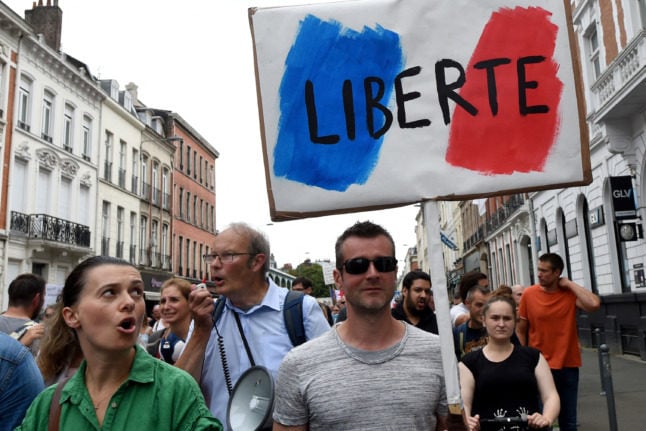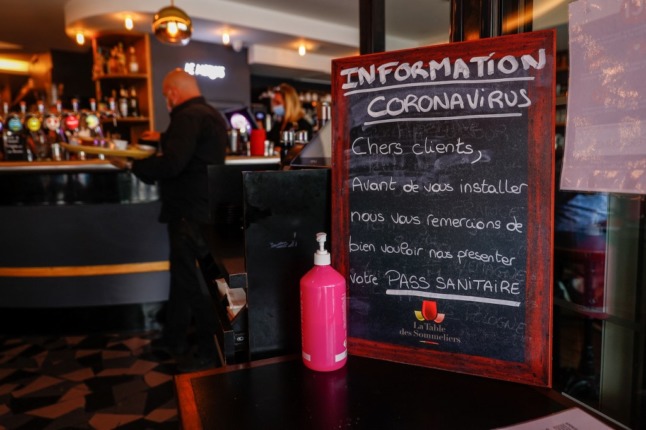Saturday’s marches were called for the sixth weekend in a row to denounce a new “health pass” system announced by President Emmanuel Macron that demonstrators see as unfairly restricting the rights of the unvaccinated.

Under the system, introduced progressively since mid-July, anyone wishing to enter a restaurant, theatre, cinema, long-distance train, or large shopping centre must show proof of vaccination or a negative test.
READ ALSO: Can tourists use France’s health passport to access museums, cafés and trains?

A valid health pass is generated by two jabs from a recognised vaccine, a negative coronavirus test or a recent recovery from infection.
Around 200 different demonstrations were called across the country, with around 9,500 people counted in southern Montpellier, 4,000 in eastern Strasbourg and 3,400 in Bordeaux, according to local authorities.
At the head of the Paris march, people held up flags and banners with the word “Liberty” on them while shouting “Macron! We don’t want your pass!”

Around 200,000 people have marched in previous weekends, according to interior ministry figures, and final tallies for Saturday’s demonstrations are set to be released in the evening.

Organisers claim the real number on previous weekends was double the figures estimated by police.

The protest movement has brought together conspiracy theorists, anti-vaxxers, former members of the “Yellow Vest” anti-government movement, as well as people concerned that the system unfairly creates a two-tier society.

Far-right leader Florian Philippot, who has accused Macron of turning France into a dictatorship and likened the health pass to apartheid, was at the Paris rally on Saturday.
The government insists the pass is necessary to encourage vaccination uptake and avoid a fourth national lockdown, with the unjabbed making up eight or nine out of every 10 Covid-19 patients admitted to hospital.
A majority of French people support the health pass system and only around a third agree with the protesters, according to a survey by the Ifop polling group for the Journal du Dimanche newspaper last weekend.


READ ALSO: Five minutes to understand: Whatever happened to French professor Didier Raoult?
Anti-Semitism worry
The protest movement has been marked from the beginning by slogans and symbols that have been denounced by Jewish groups and anti-racism campaigners.
Some protesters have worn yellow stars similar to the ones that the Nazi regime forced Jews to display during World War II, leading to condemnation from Holocaust survivors for the offensive comparison.

Others have been photographed holding up signs with the word “Qui?” (meaning “Who?”), a coded reference to Jews who are accused of spreading Covid propaganda through the media and profiting from vaccine industry.
“What I find striking is how it (anti-Semitism) is recurrent and openly displayed,” the head of SOS Racisme, Dominique Sopo, told AFP. “During the Yellow Vest movement it was something expressed on the margins… now the people carrying these signs are not hiding and other protesters are not reacting.”

Left-wing newspaper Le Monde condemned the rise in anti-Semitic behaviour in an editorial this week, calling it a “poison for society, a danger for all of us.”
“Although anti-Semitism on the far-right is old, it seems to be encouraged at the moment by the rise in conspiracy thinking,” it added.
Tristan Mendes-France, a specialist on the conspiracy movement, called Covid-19 “an accelerator of anti-Semitism because we are seeing a tragedy unfold continuously.
“People who have fallen into the conspiracy theory movement online are reminded daily about their anger and their frustration because we’re always talking about the epidemic. It’s like rubbing salt in an open wound.”

Though disputed, the health pass system has been effective in encouraging people to sign up for vaccinations, with millions of people booking appointments in the days after it was announced on July 12th.
Around 47 million people have received at least one dose, about 70 percent of the population, which is a higher rate than in Germany and Italy and only slightly behind Britain.

As of August 20th, almost 41m are fully vaccinated, as this tweet from the Ministry of Social Affairs and Health showed.
The most severe Covid-19 hotpots are currently found in France’s overseas territories such as the Caribbean islands of Martinique and Guadeloupe, as well as the Pacific islands of French Polynesia.

Polynesian authorities announced a tightening of restrictions on Saturday, with schools, restaurants and bars set to close for two weeks, while a nightly curfew will be brought forward by an hour to 8 pm.

Tourists have been told to stay in their hotels on the islands where the number of infections has increased by a multiple of 14 in two weeks, according to the head of the islands, Edouard Fritch.
France as a whole reported around 22,000 new infections in the past 24 hours, health ministry figures show.



 Please whitelist us to continue reading.
Please whitelist us to continue reading.
What an embarrassment to the human race these “people” are but it just shows the mindset of a political party when it aligns itself with this rabble.
Good to see photos with a range pf people and that The Local is reporting on these events, however the headline should be demonstrations against the Passe Sanitaire, not ‘anti vaccine’ many of the people I talk to are vaccinated, some refuse the passe sanitaire on moral grounds even though vaccinated and ‘entitled’ to one. I am deeply sad to see your comment Boggy, so full of prejudice and hatred, there are so many different people on these demonstrations, with their own experiences and convictions, they do not deserve to be lumped together as ‘bad people’ and insulted in public comments sections…sadly wording like ‘anti vaccine’ seems to provoke hatred and prejudice…😢
I have been jabbed with Sinovac. Can I avail of the vaccine pass when I return to France?